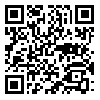Volume 14, Issue 56 (8-2020)
etiadpajohi 2020, 14(56): 225-246 |
Back to browse issues page
University of Shiraz, Shiraz, Iran.
Abstract: (2996 Views)
Objective: The aim of this study was to investigate the effectiveness of delayed discounting model of mindfulness-based cognitive therapy on delayed reward discounting, impulsivity, and sensation seeking in individuals with substance use disorders. Method: This study was a semi-experimental research conducted in the form of pretest-posttest and follow-up stage with control group. The statistical population included patients with substance use in Sanandaj clinics in 2018-2019. Among them, 40 patients with substance use were selected through convenience sampling method and were randomly placed into the experimental and control groups (20 individuals in the experimental and 20 individuals in the control group). In this study, the monetary-choice questionnaire (Karbay et al., 1999), the Barratt impulsivity scale (Barratt et al., 1997), and the Zuckerman sensation seeking scale (Zuckerman, 1978) were used. After administering pretest, the experimental group received mindfulness-based cognitive therapy during eight ninety-minute sessions in eight weeks, while the control group received no intervention. At the end of the treatment sessions, post-test was performed in both groups. After 45 days, the follow-up test was also administered. Data were analyzed via mixed analysis of variances. Results: The results showed that the intervention of delayed discounting model of mindfulness-based cognitive therapy reduced delayed reward discounting, impulsivity, and sensation seeking in individuals with substance use disorders and the effects of this intervention was lasting over time. Conclusion: The results of the current study showed that delayed discounting model of mindfulness-based cognitive therapy is an effective strategy to improve the symptoms of delayed reward discounting, impulsivity, and sensation seeking in patients with substance use disorders and can be used as an effective therapeutic approach.
Keywords: Delayed discounting model, Mindfulness-based cognitive therapy, Delayed reward discounting, Impulsivity, Sensation seeking, Substance use disorder.
Type of Study: Research |
Subject:
Special
Received: 2019/07/18 | Accepted: 2020/08/31 | Published: 2020/08/31
Received: 2019/07/18 | Accepted: 2020/08/31 | Published: 2020/08/31
| Rights and permissions | |
 |
This work is licensed under a Creative Commons Attribution-NonCommercial 4.0 International License. |



